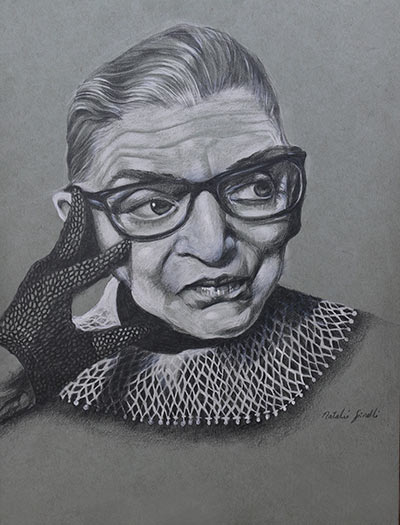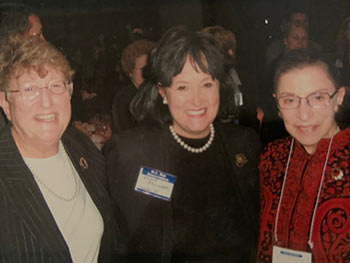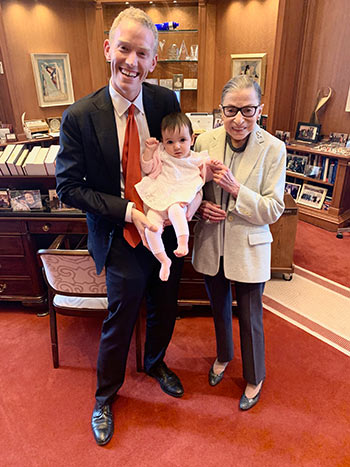
RBG: By now, most of us recognize those initials. Since her death in September, there has been a media deluge about the life of United States Supreme Court Justice Ruth Bader Ginsburg. But it may surprise Lowcountry readers to know that the Palmetto State has quite a few ties to her.
Ginsburg often quoted Charlestonian Sarah Grimke, an early advocate for women’s equality: “I ask no favors for my sex. All I ask of our brethren is that they will take their feet from off our necks and permit us to stand upright.” Those words were personal for RBG. Her admission to Harvard Law in 1956 as one of just nine female students prompted a professor to ask her why she should take the place that a man might otherwise have. Today, the ratio at Harvard Law School is 50/50 and closely mirrors that of University of South Carolina’s flagship law school.

Former South Carolina Chief Justice Jean Toal is a USC graduate and was a friend of Ginsburg for 50 years. Like Ginsburg, Toal is a trailblazer. There were only four women in her class when Toal began law school in 1965, and less than 1% of the state’s lawyers were women. Twenty years later, Toal became the first woman justice to serve on South Carolina’s Supreme Court, and, in 2000, she became its first female Chief Justice. Toal’s biography, “Madam Chief Justice,” includes an introduction written by her friend, RBG.
Toal and Ginsburg first met in 1971 when the American Civil Liberties Union was representing Vickie Eslinger, a USC law student whose application to become a page in the South Carolina state senate was rejected because of her sex. They lost the case but won on appeal. Eslinger, now a Columbia-based attorney, remembered, “Ruth taught me how important incremental legal strategy is.”

Charleston native Burden Walker was a law clerk for Ginsburg in 2013. “I’ve never been more nervous than when I interviewed with her — to be in front of the living legend,” he admitted. “RBG had a keen sense that each case had a significant impact on individuals.” Now a federal prosecutor, he sees that firsthand.
Walker explained that one of Ginsburg’s passions was civil procedure. “She thought rules were carefully designed to ensure access for every person to have his or her day in court and that the court should adhere to the rules. RBG was the first to ask a question at oral argument, usually a specific item found deep in the record. She wanted to keep the court focused on facts and was known as a ‘judge’s judge,’” he said.
Charleston attorney Armand Derfner met RBG several times. “She was a powerful force and pioneer,” Derfner said, adding that her legacy is not just in advancing women’s rights but in legal protection against all forms of discrimination. Derfner has focused on voting rights cases since 1968 and has seen the huge impact of Ginsburg’s arguments. “She was very strong in a number of racial discrimination cases,” he stated.
One example was in 2013, when the Supreme Court ruled to roll back certain protections afforded in the Voting Rights Act of 1965, indicating they were no longer necessary. Ginsburg strongly dissented and wrote that dismantling it “when it has worked and is continuing to work to stop discriminatory changes is like throwing out your umbrella in a rainstorm because you aren’t getting wet.”
In recent years, Ginsburg often sat in opposition to the majority of her fellow justices, earning her the moniker “The Dissenter.” Walker recounted: “One of her proudest dissents was in the Lilly Ledbetter case, regarding pay discrimination between men and women. RBG dissented from the Court’s ruling that Ledbetter couldn’t sue her employer for paying her less than her male colleagues. Later, President Obama signed the Lilly Ledbetter Equal Pay Act, which turned Ginsburg’s dissent into law. She kept a signed copy of the statute just outside her chamber office.”
Ginsburg’s attention to written detail was well-known, even before her time on the bench. Derfner’s team once sent her a case brief to review. “She offered suggestions on principal and concept – but even included correction of typos in the footnotes,” he mused. Eslinger remembered that, in her lawsuit to become a senate page, “one of the lawyers on the team had misplaced a comma. Ruth said she refused to put her name on such sloppy work. So when I was asked to help her write the forward in Jean Toal’s book, I broke into a sweat. But working with her made everyone better.” Ginsburg’s former law clerk agreed. “You had to be meticulous about anything you wrote for her. We often spent late nights helping her craft opinions. She would get so excited about choosing precisely the right word because it matters.”
One of Ginsburg’s trademarks was her soft-spoken demeanor. “When you first met RBG, there would be long pauses in conversation, and you were never 100% confident she was finished – but you didn’t want to interrupt,” Walker said. Eslinger added, “I think she spoke that way because she was very measured and deliberate.”
Walker described RBG as incredibly warm. After my year with her, I would regularly stop by her office to update her about my family. When my daughter was born, the Justice sent her a handwritten note with a onesie that said ‘RBG grand-clerk.’ She had the warmth of a Jewish grandmother,” he reminisced.
Ginsburg’s Jewish heritage was a large component of her identity. Rebecca Leibowitz Engel, of the Charleston Jewish Federation, recalled that “several board members attended the Jewish Federations of North America General Assembly in November 2018, where we got to hear her speak in person.” Ilene Turbow, the Charleston chapter’s vice-president remarked, “It was so empowering. I still remember her deliberate answers and gentle, powerful presence.”
Ginsburg’s death in September 2020 marked the end of an era. When her casket was at the Supreme Court, Walker stood watch, along with over 100 other former law clerks. “It was very moving,” he said. “She meant a great deal to us all.”
“Ruth affected all women, whether they knew it or not,” Eslinger explained. “She wanted to make sure the Constitution belonged to all Americans. There will never be another one like her.”